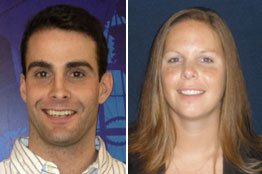
Frost and Sullivan life sciences industry analysts Mr Justin Collishaw (left) and Ms Christi Bird
In the wake of US Supreme Court's win-win verdict in Association for Molecular Pathology vs Myriad Genetics case, Frost and Sullivan life sciences industry analysts, Mr Justin Collishaw and Ms Christi Bird, talk to BioSpectrum about the impact of the verdict on the future of breast cancer gene therapy, gene research areas for geneticists, investments and revenues of test and drug developers, as well as on millions of women who are affected by BRCA1 and BRCA2 gene mutations. Excerpts from the interview:
What will be the impact of US Supreme Court's verdict on the future of gene therapy?
Ms Bird: By invalidating human gene patents, diagnostic companies have complete the freedom to develop gene panel diagnostic tests that compete with existing tests, if they do not infringe on upheld cDNA and methods patents. This competition is a win for consumers, as it may lead to improved tests with greater gene coverage. The industry remains divided on how these new patent terms will affect the marketplace. However, there is no doubt that this ruling will cause a new gene testing competitive landscape to emerge.
Will the verdict make BRCA1 and BRCA2 testing cheaper?
Mr Collishaw: The verdict has already made testing cheaper. DNATraits offers a test for the BRCA1 and BRCA2 genes in the US for $995 as compared to Myriad's test that costs $3,000. As additional competitors develop their own versions of BRCA1 and BRCA2 testing, they are likely to compete on cost, and the price will continue to decrease.
Read more: Industry rushes to make BRCA gene test available and affordable
How does the Court's ruling on synthetic genes affect breast cancer risk testing?
Mr Collishaw: It still allows companies to protect their synthetic DNA patents, which will ensure intellectual property protection for individual tests such as Myriad's BRACAnalysis. However, the decision also provides competitors with an opportunity to develop their own versions of BRCA1 and BRCA2 gene testing, as long as their versions do not infringe on the patents of Myriad's test. Perhaps most importantly, it allows researchers to freely perform research-related activities on BRCA1 and BRCA2 genes without risk of legal liability, possibly leading to new therapeutics for the treatment of breast cancer.
Will the ruling stifle innovation in private companies?
Mr Collishaw: No. The decision will help spur innovation. If instead the court's decision supported patent protection of human genes, only the patent holder could perform R&D on a patented set of genes. Without competition there are simply less researchers working on any given set of genes, which limits scientific progress. As the decision stands, it does reduce the monetary incentive for being the first to successfully isolate genes associated with a disease, but not enough to detour future development from companies. If a company is the first to isolate a set of genes and develop a diagnostic test, there will always be an immense monetary award associated with being first to market.
How will the verdict affect the revenue of Myriad Genetics?
Mr Collishaw: Myriad's revenues will be negatively impacted as their monopoly on BRCA1 and BRCA2 gene testing in the US has come to an end. The stock market has already reflected the anticipated loss in revenues as Myriad's stock has fallen 20 percent in the week following the court's decision due to investor expectations that competitors will cut into Myriad's revenue stream.
How do such patent-related issues affect the future of revolutionary researches?
Mr Collishaw: There will always be a balance between protecting research and development efforts that result in scientific breakthroughs and providing access to these breakthroughs so these efforts could be furthered by the scientific community.
How can the verdict affect the total healthcare cost?
Mr Collishaw: Any savings on the cost of Myriad's BRCA1 and BRCA2 gene test is negligible when compared with the immense total health care costs for the treatment of oncology. However, as additional competitors enter the market with their own versions of BRCA1 and BRCA2 gene testing, the number of tests performed each year will increase due to discounted testing and additional consumer awareness from the promotional activities of multiple testing companies. If a higher proportion of patients achieve early disease detection, there will be total healthcare cost savings associated with the treatment of earlier stages of cancer, which have higher cure rates and generally require less costly treatment when compared to late stage cancer.
Read more: Genetic tests to bring down spiraling healthcare costs
What are the other areas in biological research that needs immediate attention and why?
Mr Collishaw: Stem cell research. Stem cell research has the power to make traditional donor organ transplants obsolete. If successful, there would be no need for donors. An individual's organ would be grown in a lab with a genetic match to their own DNA. This would nearly eliminate organ rejection as the body's immune system would no longer recognize transplanted organs as foreign. This is just one of the many possibilities for stem cell applications and research.




